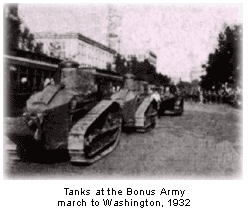Congress had overridden Herbert Hoover’s veto of a veterans’ compensation act early in 1932, which provided some relief for ex-servicemen, but also fueled sentiment for having payments made in cash. Such requests were swiftly rejected by Republican leaders who believed that such irresponsible action would only deepen the nation’s woes.
 In late May, a group of veterans numbering around 1,000 came to Washington, D.C. to lobby for their cause. Many of these were unemployed and homeless, and they vowed to remain in the nation’s capital until favorable legislation was passed. As the weeks went by, the so-called Bonus Expeditionary Force (BEF) grew to more than 17,000. Many of these took up residence at a camp outside of the city on the banks of the Anacostia River*; others made homes for themselves in vacant government buildings and even on the lawn of the Capitol. Despite the swelling numbers, the on-going demonstrations remained essentially peaceful.
On June 15, the House of Representatives passed the Patman Bonus Bill, a measure authorizing the printing of $2.4 billion in fiat money to be used for cashing out the veterans’ bonus certificates. This relief measure was promptly stopped cold in the Senate. Before adjourning for their summer recess, both houses of Congress offered a meager gesture to the veterans by agreeing to provide them with transportation money for returning to their homes. Most of the veterans were exhausted by their stay in the sweltering capital and accepted the funds; however, about 2,000 determined protestors remained. Metropolitan police were called in to disperse this remnant and violence erupted that resulted in the deaths of two policemen and two veterans.
Hoover feared that the country was on the verge of descending into mob rule and that an assortment of radicals was in the forefront of the movement. On July 28, the depleted Bonus Army marched down Pennsylvania Avenue, chanting,
In late May, a group of veterans numbering around 1,000 came to Washington, D.C. to lobby for their cause. Many of these were unemployed and homeless, and they vowed to remain in the nation’s capital until favorable legislation was passed. As the weeks went by, the so-called Bonus Expeditionary Force (BEF) grew to more than 17,000. Many of these took up residence at a camp outside of the city on the banks of the Anacostia River*; others made homes for themselves in vacant government buildings and even on the lawn of the Capitol. Despite the swelling numbers, the on-going demonstrations remained essentially peaceful.
On June 15, the House of Representatives passed the Patman Bonus Bill, a measure authorizing the printing of $2.4 billion in fiat money to be used for cashing out the veterans’ bonus certificates. This relief measure was promptly stopped cold in the Senate. Before adjourning for their summer recess, both houses of Congress offered a meager gesture to the veterans by agreeing to provide them with transportation money for returning to their homes. Most of the veterans were exhausted by their stay in the sweltering capital and accepted the funds; however, about 2,000 determined protestors remained. Metropolitan police were called in to disperse this remnant and violence erupted that resulted in the deaths of two policemen and two veterans.
Hoover feared that the country was on the verge of descending into mob rule and that an assortment of radicals was in the forefront of the movement. On July 28, the depleted Bonus Army marched down Pennsylvania Avenue, chanting,
Hoover had had enough and summoned federal troops. He remarked that, "after months of patient indulgence, the government met overt lawlessness as it always must be met if the cherished processes of self-government are to be preserved."Mellon pulled the whistle,
Hoover rang the bell,
Wall Street gave the signal
And the country went to hell.
Army Chief of Staff Douglas MacArthur was in command, assisted by Dwight D. Eisenhower, George S. Patton Jr. and others. An assortment of tanks, cavalry, infantry and a machine gun detachment moved in pursuit of the demonstrating veterans, forcing the Bonus Army out of the city. Tear gas was used to break up the assemblage at Anacostia Flats and the shanty town was burned to the ground. In the melee, more than 100 veterans were injured and a three-month-old baby died from tear gas inhalation. The president claimed that the Army had used force far in excess of its orders, but that explanation made little impression on the public. If any remote possibility of Hoover’s reelection remained in mid-1932, it ended on that July day. Most Americans were disgusted by the spectacle of heavily armed troops moving against the Bonus Army, destitute former servicemen who had fought for their country only a few years previously.